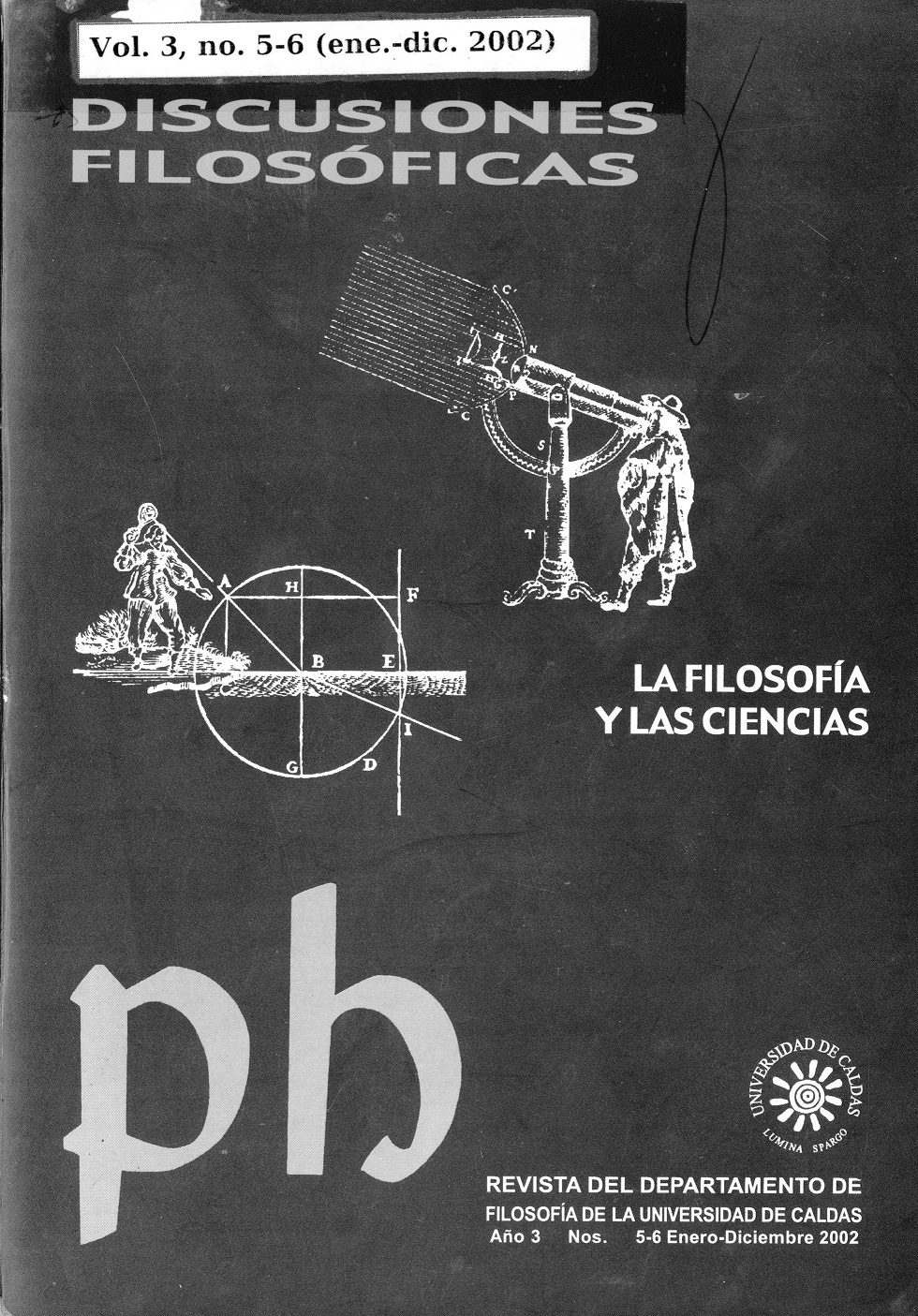Autores/as
Resumen
La idea central de la semántica y de la ontosemántica- es muy simple. Parte del principio de que ciertos elementos del lenguaje se encuentran en una relación de referencia con lo extralingüístico, y es a partir de la referencia de los términos como se determina el mobiliario del mundo.
Discusiones Filosóficas epartamento de Filosofa Universidad de Caldas N°' 5 6 Enero - Diciembre de 2002 De esta manera, basta fijar el universo del discurso científico los elementos lingüísticos que emplea para determinar qué entes pueblan para la ciencia el mundo. Cuáles son los compromisos ontológicos en la terminología de Quinenes que es necesario aceptar si se aceptan a las teorías científicas.
Voy a sostener que al hacerlo, se adoptan compromisos ontológicos adicionales, que en ocasiones no se encuentran explicitados, y que pueden resultar inaceptables.
El presente trabajo está destinado a mostrar esos compromisos no explícitos o inadecuadamente explicitados, la índole de su inaceptabilidad y la propuesta de un esbozo de ontosemántica fisicalista, i.e. que acepta únicamente objetos espacio temporalmente situados.
Citas
CARNAP, Rudolf. Empirismo, semántica y ontología. En: Muguerza J. (ed.) 1974; pp.400-420)
DE SAUSSURE, Ferdinand Curso de lingüística general. México: Planeta-De Agostini, 1985.
DuMMET, M. Frege. Philosophy of Language, Londres, 1973.
FALGUERA, José Luis Inconmensurabilidad y ontosemántica representacional, en: Teoría, 13/1: 1998; 161-185.
FALGUERAS, C. Y MARTÍNEZ (eds.). Teorías formales y teorías empíricas, Publicaciones de la Universidad de Santiago de Compostela, 2001, pp.623-637.
FREGE, Gottlob. Sobre concepto y objeto. En: Escritos lógico-semánticos. Madrid: Tecnos,1974a.
El pensamiento, una investigación lógica". en Escritos lógico-semánticos,Madrid: Tecnos, 1974b.
GOODMAN, N Y QIn NE, W.V. Towards a constructive nominalism. En: Journal of Symbolic Logic, 12, 1947.
HUME, David. Tratado de la naturaleza humana. Barcelona: Folio, 2000.
JARAMILLO URIBE, Juan Manuel ¿Es la ciencia una rama de la literatura fantástica?Pretexto para una reflexión sobre el realismo, Cuadernos filosófico-literarios N°12.Manizales: Departamento de Filosofía-Universidad de Caldas (Colombia), 2001.
KLIMOVSKI, Gregorio. Comunicación personal, 1973.
LORENZANO, Césal Teorías científicas, ontología y lenguaje. En: J.M. Sagüillo, J. L, 2001.
MOULINES, C. Ulises. Exploraciones metacient ficas. Madrid: Alianza Editorial, 1991.
Pluralidad y recursión. Madrid: Alianza Editorial, 1982.
NAGEL, Thomas (1965) "Physicalism", en Philosophical Review, Vol. LXXIV, No. 3
PEIRCE, Charles S. 1966 "Letters to Lady Welby", 31 Jan 1909, pag. 406 en: Philip P.Wiener (ed.). Charles S. Peirce: Selected Writings (Values in a Universe of Chance),Dover, New York, NY, 1966.
POPPER, Karl. Epistemología sin sujeto cognoscente. En: Conocimiento Objetivo, Madrid: Tecnos,1974.
_________La lógica de la investigación científica. Madrid: Tecnos, 1973.
SIMPSON, T.M. (ed.) Semántica filosófica: problemas y discusiones. Buenos Aires: Siglo XXI, 1980.

 PDF
PDF
 FLIP
FLIP






















